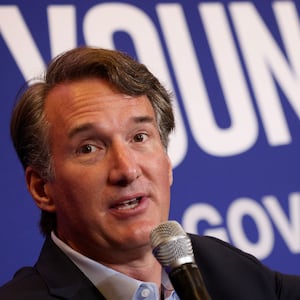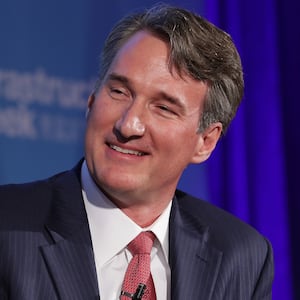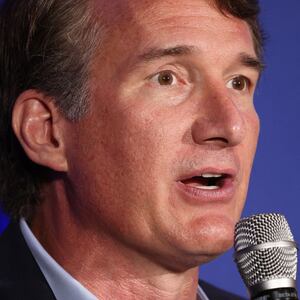Recent reports in this year’s Virginia governor's race have suggested a “tightening” contest, with the state’s Democratic former governor Terry McAuliffe only holding a slim edge over Republican businessman Glenn Youngkin a month out from the election. The nonpartisan Cook Political Report, among the most respected of the electoral prognosticators, leant its weight to those reports last week when it nudged the race in Youngkin’s favor, from “lean Democratic” to “toss-up.”
Those reports lean on polling, fundraising numbers, as well as a healthy dose of gut feeling.
But if you were to look deeper into one aspect of the contest—the money race—the election isn’t nearly as close as it seems.
When the two campaigns disclosed their latest filings earlier this month, headlines implied equal footing. “Youngkin and McAuliffe report massive summer fundraising hauls in Virginia’s race for governor,” The Washington Post blared. “McAuliffe, Youngkin report record summer fundraising hauls in Virginia governor’s race,” The Hill announced. And the Center for Responsive Politics, a nonprofit that tracks political raising and spending, titled its analysis, “As Virginia governor’s race tightens, McAuliffe and Youngkin report big fundraising numbers.”
More locally in Virginia, it was the same thing. A headline from WRIC in Richmond read, “Money continues to flood into Virginia governor’s race—Youngkin, McAuliffe combined raised $66M through August.” Another, from central Virginia outlet the Augusta Free Press, declared “McAuliffe, Youngkin raising prodigious amounts of money in governor race.”
But that depends how you define “raising.”
Below the headlines, all of those articles point out a key distinction that reframes the analysis entirely. Nearly half of the staggering $35.3 million the Youngkin campaign has raised came from one donor: the candidate himself.
The wealthy former CEO of Carlyle Group has put a total of $16.5 million into his campaign, $4.5 million of it in August alone. And that cash wasn’t a gift outright, either, but a recoupable loan, meaning Youngkin can later refill the nibble he took out of his estimated $400 million net worth.
By contrast, the well-connected McAuliffe—a wealthy entrepreneur in his own right—has not contributed to his campaign’s $31.8 million war chest.
But even those self-financing differences are just the top of the money iceberg. The imbalance is also reflected in the number of overall contributions. McAuliffe collected 23,660 total donations, nearly doubling Youngkin’s 13,293, according to data from the Center for Responsive Politics.
Fundraising totals, while not cited as an official metric of support, factor into two key dials on a campaign’s dashboard: a fuel gauge for resources, and a meter of voter enthusiasm and commitment. And Youngkin actually appears to be trailing in both.
As far as available resources go, Youngkin’s total haul at the end of August outstripped McAuliffe’s by a few million. But the former executive actually didn’t have as much in the bank. He’d also spent more—and reported holding less than half of McAuliffe’s $12.6 million cash on hand.
The second yardstick—enthusiasm—also favors McAuliffe.
The state’s governor from 2014 to 2018, McAuliff has deep political connections—he’s former chair of the Democratic National Committee and a lifelong Clinton confidant—which make him a known entity not just in the state, but across the country. Campaign filings show he has attracted millions of dollars more than Youngkin nationally, pulling from every state but North Dakota, and in the process, nearly tripling his opponent’s out-of-state ledgers.
Veteran Democratic strategist Jesse Ferguson, who has worked a number of Virginia elections, said the combination of Youngkin’s loans and lower contribution totals suggests the sense of support behind him may be inflated.
“Youngkin has the personal resources to run a very competitive campaign in a swing race, but his fundraising doesn’t demonstrate a lot of public enthusiasm for him,” Ferguson said. “To the extent to which Glenn Youngkin has to rely on his own bank account may show that the emperor has no clothes.”
Ferguson also remarked on how Youngkin appears to be spending his money.
“He’s always wanted this campaign to be basically a Seinfeld episode—a campaign about nothing,” he said. “If he is able to use his personal bank account to promote himself without ever engaging on any issue, he sees that as a path to victory. But if you look at how he’s used his financial advantage, he’s run ads that basically say, ‘I may be a Republican but I’m not an asshole.’ He doesn’t think his views or qualifications should matter as long as he is able to run the ad campaign with images of him playing basketball.”
Tyler Law, another Democratic strategist, offered a similar take.
“Glenn Youngkin never really had anything special about him other than that he was really rich. But if Glenn’s distinguishing characteristic is that he’s a successful businessman, Terry also checks that box,” Law said, referencing McAuliffe’s private sector career.
The lifelong pol may have good reason to downplay that career, however.
In 2017, Chinese investors in McAuliffe’s electric car company, GreenTech Automotive, hit him with a $17 million fraud lawsuit. A judge dismissed the complaint the next year for lack of a clear claim, but the company had in the meantime declared bankruptcy. Between 2009 and 2016, McAuliffe had also invested nearly $700,000 into funds managed by Youngkin’s Carlyle Group, though he has withdrawn almost all of it, claiming only $5,000 remains with the company.
And Youngkin’s ads have indeed hammered home his capitalist credentials and political “outsider” status. But in a debate earlier this week, the devout Christian exhibited a willingness to play to the far right when pressed on issues like his support for former President Donald Trump—Youngkin said he’d vote for Trump in 2024—and vaccine mandates, which he said he opposes, except in the instances of vaccines already mandated in the state.
Asked for comment, Youngkin spokesperson Matt Wolking—himself a former deputy communications director for Donald Trump’s presidential campaign—also leaned exclusively on the Republican’s private sector experience.
“Terry McAuliffe is a career politician of 40 years, Clinton acolyte, godfather of the modern-day progressive Democrat Party, wannabe president, and is bought and paid for by special interest union bosses and radical groups that want to defund the police. Glenn Youngkin is a business leader who decided to run for governor because he loves Virginia and believes Richmond can serve the people better, and he will be the first governor in Virginia history to refuse a salary as governor,” Wolking said.
McAuliffe spokesperson Renzo Olivari said the Democrat is running an issues-based campaign, predicated on defeating COVID, creating jobs, and putting health care and high-quality education within reach of more Virginians.
“Meanwhile, Glenn Youngkin is running a hyper-partisan campaign predicated on his four-time endorsement from Donald Trump, and his own stated priorities: banning abortion, pushing anti-vaccine rhetoric and policies based on election conspiracy theories,” the spokesperson said.
Despite Youngkin’s paper tiger fundraising operation, headlines still suggest a “tightening” race in the home stretch.
Polls show the contest has been close for a while. But with the exception of one outlier—a University of Mary Washington survey of 528 likely voters—McAuliffe has consistently been on top by about 3 points since August. Days before Cook shifted the race, former Trump communications guru and veteran GOP pollster Kellyanne Conway released a survey showing McAuliffe up by 3, with 50 percent support.
“This is not a tightening race. This is and always was going to be a tight race,” Ferguson said.
But the thing that makes the Virginia race so compelling, he added, is that the state “has a little bit of all kinds of voters. Rural, suburban, veterans, small business, a corporate community, large Black, Latino, and Asian populations. It’s a mixing bowl of voters, meaning there are more than enough Republicans for the GOP to win. That was true from the start of the race and that’s still true today.”
Olivari, the McAuliffe spokesperson, pointed out that in his 2013 victory, McAuliffe became the first Virginia gubernatorial candidate in nearly 40 years to win with a president of the same party in the White House.
But in the previous election, Virginia Democrats failed under those same conditions. In 2009, the last time Republicans took the governor’s mansion, McAuliffe lost in the primary to then-state senator Creigh Deeds. Deeds went on to take a beating from Republican Bob McDonnell, who won with more than 58 percent of the vote—a dramatic reversal in the former capital of the Confederacy, which had the year before clinched the presidency for Barack Obama.
Asked whether McAuliffe might get drowned by a similar swell against President Joe Biden, Obama’s running mate, Ferguson demurred.
“That’s a question I can answer for you the day after the election,” he said.








